Regeneration can be confusing for even the most ardent Doctor Who fan. Our intrepid hero literally becomes a new person and the adjustment is always a little heartbreaking, as though you have to say goodbye to one friend in order to gain another. The process itself is woolly; the Doctor himself admitting upon his seventh transformation that it was “a lottery” and that he had never been any good at it.
But does regeneration make sense, even if you’re no good at it? I think it does. In fact, I’d argue that the events leading up to each regeneration have a very heavy impact on how the next incarnation turns out. Though he can’t pick out faces and then discard them the way other Time Lords can, subconsciously, the Doctor is clearly and cautiously reconstructing himself, adapting according to his triumphs and failures each time.
Don’t believe me? The pattern is there. Check it out:
First to Second Doctor

The First Doctor got to live out his life in his initial body to a respectable old age, eventually dying of natural causes—not a bad way to go for your first run. He was a quirky old man with an odd laugh who showed a grandfatherly protectiveness toward many of his companions. He was also, and there’s no better way of putting it, a big old grump. He was the man in charge and liked to be treated as such, and many of the people who traveled with him (namely Ian and Barbara) took him to task for being bossy and secretive.
It’s not hard to infer that perhaps the First Doctor wanted to use this new beginning as a chance to upgrade. Be a little more hip, a little younger and easier to love since he had fallen into the practice of taking on new friends wherever he found them. Perhaps his sense of humor was in need of an overhaul, perhaps he needed a haircut like all the young people (Read: Kids in the 1960s who loved The Beatles) were getting. Eh voila, enter Doctor the Second.
Second to Third Doctor

The Second Doctor was even more apt at getting himself into trouble by virtue of his ability to clown around, letting his enemies underestimate him. He was a veritable poster child for playing the fool, and he adored his companions (especially Jamie), huddling with them in corners and double-talking them into exasperation. But he broke the rules of the Time Lords, meddling and giving other species knowledge of their practices and other times. His regeneration was forced on him by his own people.
So the Doctor was understandably petulant and more than a little brassed off that the Time Lords had taken matters into their own hands, planning to exile him on Earth with no knowledge of how to repair his own TARDIS. He would need to be adaptable to keep himself occupied and dramatic enough to impress all the humans he was stuck amongst, but the chances of that petulant streak not embedding itself as well? Yeah, not good.
Third to Fourth Doctor
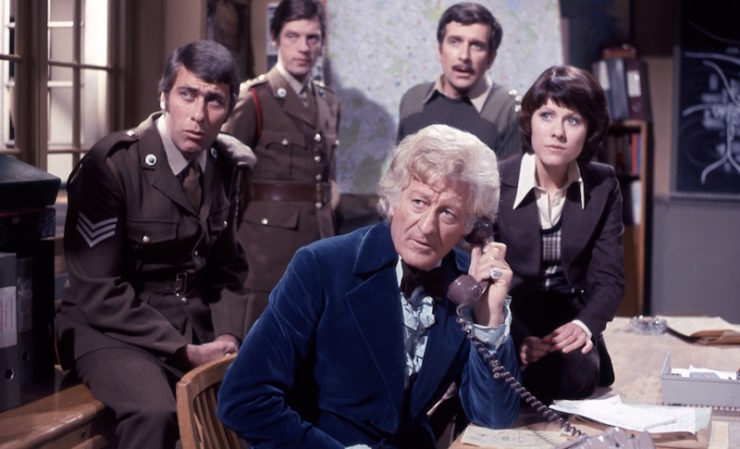
The Third Doctor was something of an aging James Bond figure—a flashy old man with a love of opera capes, fast modes of transportation (blessed Bessy aside), and Venusian aikido. He could get supremely pouty and a bit rude when he didn’t get his way, but he had plenty of people to fuss over him at UNIT, his new home away from home. The Master only added to that sense of importance by showing up all the time to play “How Will I Attempt to Take Over the Universe and Let You Stop Me This Week?”
The Third Doctor had a good run, and also got his privileges reinstated by the Time Lords, free once again to galavant across the universe. He’d made many friends, done so much good, and had a heck of a lot to show for it by the time he got accidentally dosed with radiation. Perhaps it was time for that sarcasm to fade, to let those old wounds close up. Perhaps he would like to be a little romantic next time around—he was done being the old man. Perhaps he could cause all the mischief of his second incarnation over again, let his ego shine, and be all the more lovable for it….
Fourth to Fifth Doctor
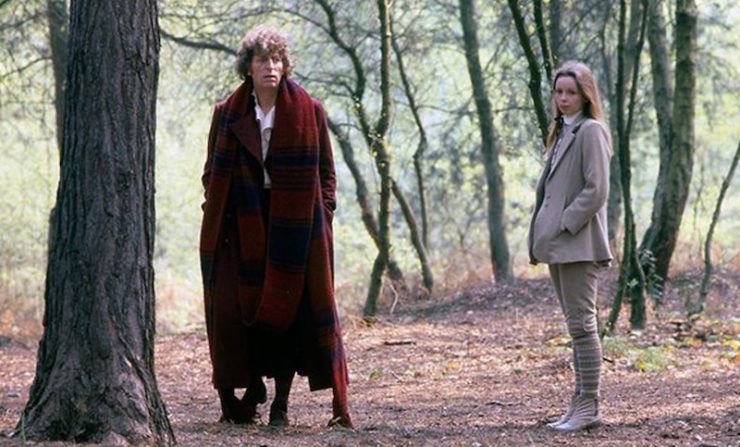
The Fourth Doctor had it all going for him. He had an answer for everything and a demeanor to match. He was charming to everyone, especially lovely ladies. He gave candy to every stranger he encountered, and they all took it (proving that their mothers had taught them very poorly). He was positively mad, but also properly thoughtful, and he had experience enough under his belt to tackle some really hard questions. He was on a roll. Companions came and went, enemies came and went, and his scarf weathered every storm.
He got a little too comfortable, you might say. That old friend of his, the Master, finally managed to get a real one-up on him, dropping him off a radio telescope. But he had a gathering of friends there when he said goodbye, so many people who loved him, so maybe that was the answer. Maybe it was time for the Doctor to embrace all those people, to not try and solve every problem on his own. It was time to feel a little younger, more like a contemporary of his traveling mates. It was time to have a crew, a sort of family to usher around.
Fifth to Sixth Doctor
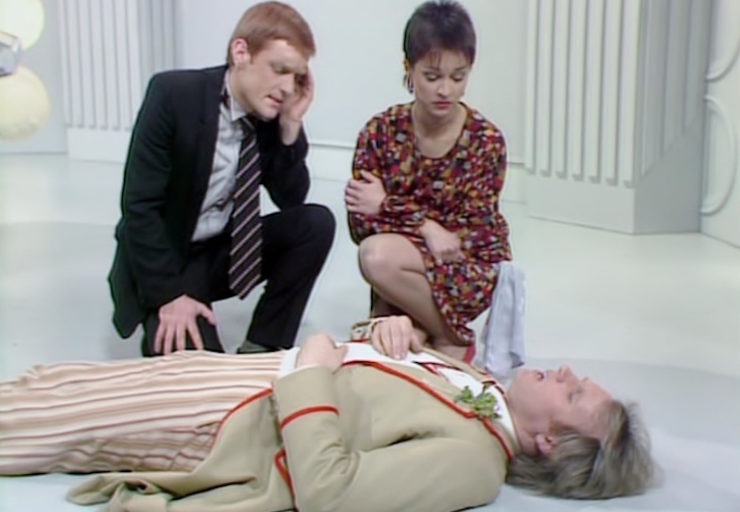
The Fifth Doctor had a pretty rough time of it. It turned out that his family plan backfired—Five’s companions rarely listened to him, squabbled over his every decision, and never stayed where he told them to. He was the second Doctor to lose a companion, the first Doctor to lose one so close to him. After Adric’s death, things sort of fell apart; Nyssa’s departure left him with Turlough, who was initially trying to kill him before the Doctor straightened out the mess. Tegan ran off in horror one day without really saying goodbye, Kameleon sacrificed himself, and Turlough eventually found a way home. The Doctor was left with a brand new companion named Peri, who somehow still wanted to travel with him despite all the dangers. She almost died on their first official outing, but the Doctor got her a poison antidote in time, even if he didn’t save any for himself.
And as he succumbed, literally hearing the ghosts of his companions tormenting him for his failings, you can just imagine him thinking… would all of this have gone so wrong if I had just been a bit tougher? More sure of myself, more of a leader? If I had just been a little irascible, harder to say no to, maybe none of this would have happened and all of my friends would still be here. And that, ladies and gents, is how we ended up with something completely different….
Sixth to Seventh Doctor
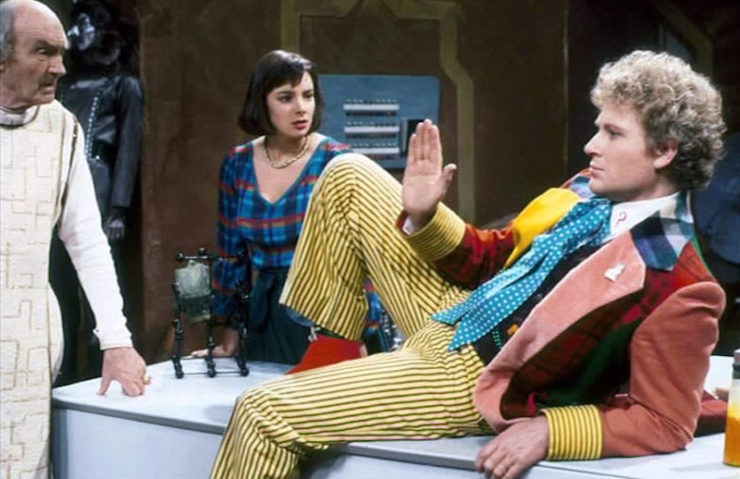
The Sixth Doctor gets a bad rap because he is by far the most pompous, arrogant, shrewish incarnation of the Doctor in the show’s history. That doesn’t mean he was entirely unlovable—in fact, Six had some lovely moments of genuine wonder and was far funnier than he is generally given credit for. The darkness that had crept in to his persona was easy to understand, given how rough his previous departure had been. The Sixth Doctor certainly was the man in charge again, and it was simply because he insisted that everyone else around him was an idiot.
His death was accidental, with another childhood friend (the Rani this time) rocking the TARDIS hard enough that the Doctor hit his head and never woke up… as that man. Six had mellowed by the time of the regeneration and it seems possible that he realized he had gone too far. He didn’t have to be quite so rude, so snobbish. He was used to having his way, but maybe this time around he could get it through coercion, through misdirection. It was time to play things smart.
Seventh to Eighth Doctor
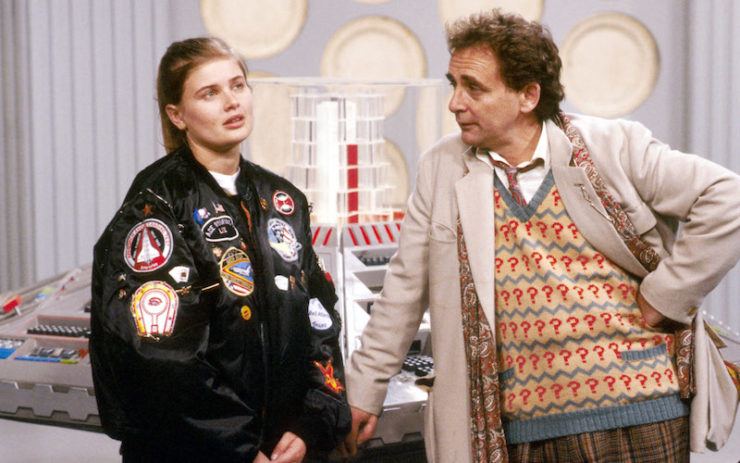
The Seventh Doctor was a tricky one. He was a grab bag sort of personality, an interesting melting pot of character traits that had come before. He had the mentoring tendencies of the First Doctor, the goofiness of the Fourth, the talent for making himself appear less threatening like the Second. However, this Doctor was an older one with purpose, plans of his own, and missions to complete. He was exceptional at manipulating his companion Ace, but they were an inseparable pair, he the professor and she the pupil.
By the time the Seventh Doctor regenerated, he was at the end of that body’s life. He had spent quite some time as that sharp old man, and he was a bit of a comfort creature, sipping tea and reading in the TARDIS console room. His death was a surprise, walking out of his ship and into a San Francisco gang fight, and then treated by doctors who had no knowledge of alien physiology. Because Seven was getting older, it was likely (for the first time since that first regeneration) that he’d had a few moments to think on what he hoped to come out like next—and it was time for new beginnings. Time to go younger again since he had spent so much time as an old man, another chance to discover the universe with fresh eyes. Romance once more, and maybe a little less plotting. Something handsome and wide-eyed should do it.
Eighth to War Doctor
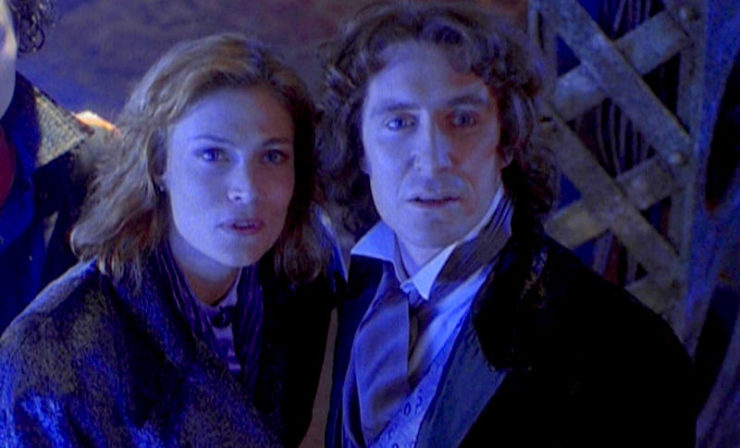
The Eighth Doctor had the look of a poet about him, all curls and earnestness with a velvet frock coat. He was excitable, almost childlike when enthused, and contained a vulnerability that had never been seen before in the character. He was the first Doctor to ever kiss a companion, albeit in a moment of sheer joy.
Tragedy struck. The Time War raged and he tried to stay away, but when saving one life proved too difficult, something broke. It was at this point that the Eighth Doctor made perhaps the most pivotal decision made by any incarnation—to become another man. Because the universe couldn’t possibly need a Doctor anymore. This regeneration was aided, and so what he received was dependent on a choice… and the Eighth Doctor chose to become a warrior.
War to Ninth Doctor
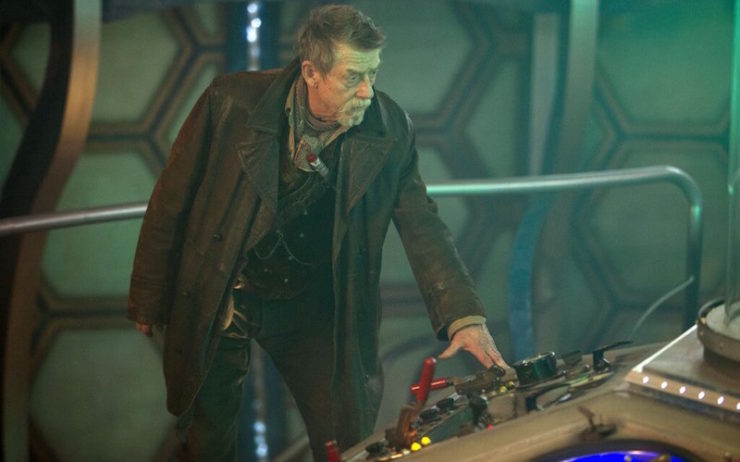
The War Doctor likely fought this battle for a long time—when he was first shown after his regeneration, he is much younger than he appears at the end of the Time War. Yet for all the magic potion that triggered his change was meant to make him hard and cold and willing to do whatever it took, this warrior was still unmistakably the Doctor. Not even an engineered regeneration could take that from him.
Thankfully, he was spared the fate that being a warrior would have left him… but he wasn’t allowed to know it. As he regenerated, he also forgot. Of course, what he was thinking of at the time turned out to be paramount—muttering about not having big ears meant that he got big ears. But beyond that, this Doctor renewed while harboring a wound that would scar him for centuries to come. And that was bravely where the new series chose to reintroduce us to him.
Ninth to Tenth Doctor
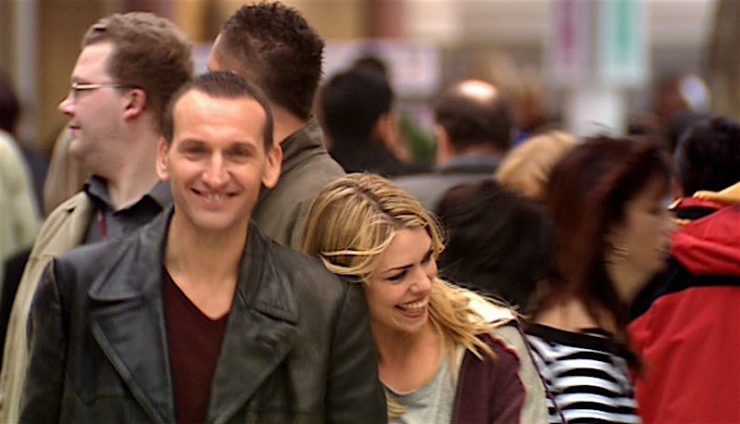
The Ninth Doctor clearly suffered from Post Traumatic Stress Disorder, a man frightened of himself and what he could do, who still tried his best to carry on because he couldn’t think of anything else to do with himself. And then he met a girl. A girl who was willing to take some of the weight, who believed he was absolutely everything in the universe, who knew he was worth it when he had all but given up on himself. The only problem was, he was a little old to be her boyfriend.
When all hope seemed lost, that girl came back to him and saved him. And that was the moment, the place where the Doctor came back, too, and realized that he was still pleased to be that man even after all he (thought he) had done. More importantly, he realized that he loved that girl. And as he regenerated, he was thinking of that love and thinking of renewal, and he probably thought it would be fantastic if he could just be perfect for her. To be what Rose needed him to be. Time to be younger and brighter, cocky but cool, more physical and even more mouthy.
And no one would ever tell him that he was too old to be Rose’s boyfriend again.
Tenth to Eleventh Doctor
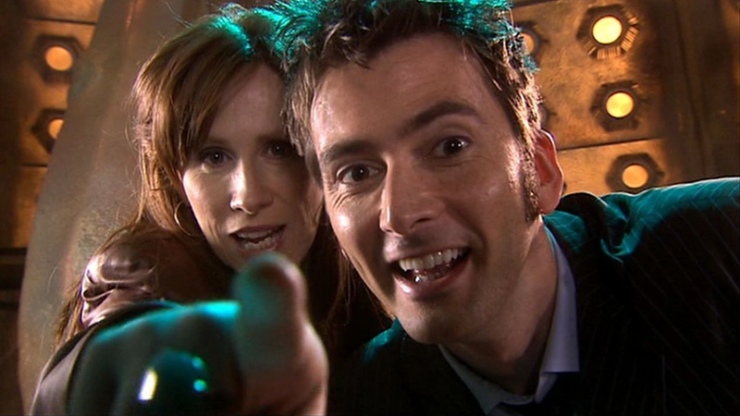
The Tenth Doctor was patently Rose’s Doctor, even long after she had gone, and that worked for him. Because he had been loved, the Tenth Doctor loved himself, a trait that had never been so apparent in any Doctor before. He was awkward yet suave, put a lot of effort into looking the part, and was charming as all get out. He was the epitome of “geek chic,” as we say. But he still harbored a mountain of grief from his perceived actions in the Time War, and that mountain didn’t get any easier to chip away at. He developed something of a god complex and made some poor choices. And he lost a lot of friends on the way.
The Tenth Doctor didn’t really want to regenerate. In fact, he was the first Doctor to make that pointedly clear—that regenerating feels a little like dying, becoming something else. The Tenth Doctor didn’t want to stop being himself, and so there was a lot of hold over to the Eleventh. He got even younger looking, kept a pretty snazzy dress sense, and maintained that ability to posture his way out of a lot of situations. But the guilt from the Time War needed to be set aside, and he needed to stop being so up front with his companions….
Eleventh to Twelfth Doctor
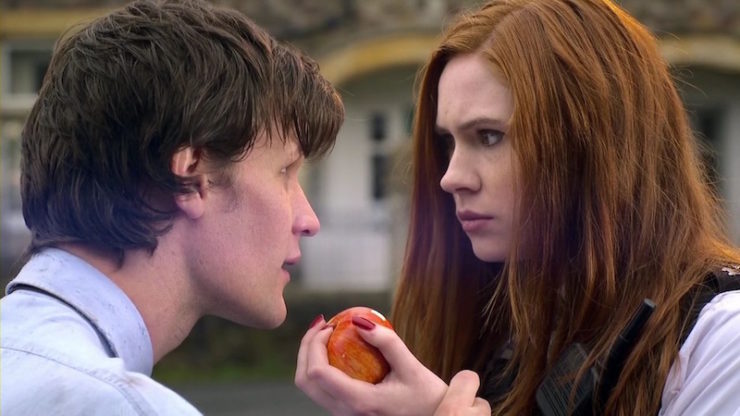
“The Doctor lies.” The Eleventh Doctor certainly did, and he did because he thought he had to. He buried some things deep down, tried to forget the past that had haunted him in his previous two incarnations. And he became guardian again to a little girl—like he had with his granddaughter—and had a funny sort of romance with that little girl’s daughter because, well, the daughter was a bit crazy and so was he. He got himself a proper family… and then he lost them. He gave up on companions for a time because the attachment was just too much. Thank goodness for an impossible girl.
And then something truly miraculous happened. The Doctor was absolved of his guilt in the Time War, and all because his Bad Wolf was still determined to keep him safe across the universe. He found out that his people survived somewhere out there, that Gallifrey never fell—he didn’t have to keep running away from himself like he was the monster. He thought that he would live out the rest of his life on Trenzalore, protecting the people of a small town, that this was his last stand… and he was content with that. And then he was given an unimaginable gift from a crack in the universe, and was able to start over again—this time unafraid, joyful for a chance to live on. Time to find that lost home, and maybe he could allow a little maturity to seep in because of that. More self-assurance. So much work pretending to be a young man; since he was used to age by now, why not try something with a few more years on for size?
Twelfth to Thirteenth Doctor
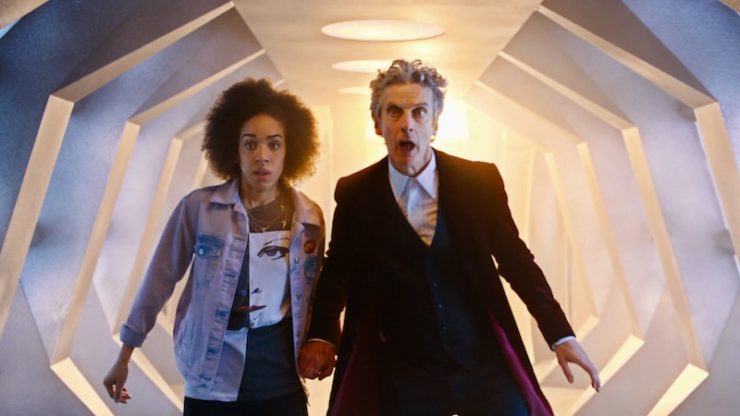
The Twelfth Doctor was determined to do things his own way. He taught his first companion to become her own kind of Doctor, he punched his way back through to Gallifrey, he reconnected with his oldest friend (that’s Missy) and came so very close to reigniting their partnership. This Doctor learned a lot: about sacrifice, about friendship, about staying put for a while (at Bill’s university, teaching under-motivated students). He reaffirmed his purpose and place in the universe, not as a hero, but as the person who decides to do what’s right—because it is kind.
The Twelfth Doctor, much like the Tenth, enjoys being himself and isn’t particularly interested in changing again. The Doctor’s fear of regeneration is clearly an ever-present issue for him, and whenever he gets too much time to think about it, it starts to panic him. In trying to put it off, the very earliest version of himself (the First Doctor, appearing in “Twice Upon A Time”) will have to knock some sense back into him.
Outgoing showrunner Steven Moffat has thrown his opinion into the ring on the Thirteenth Doctor’s incarnation, saying, “I suppose at the back of my mind I’ve known for ages the next Doctor was going to be a woman – although I didn’t know which woman – so I was thinking, ‘Why does he subconsciously make that choice?’ Maybe seeing the whole span of his life as a man, seeing himself as the Hartnell Doctor, might make him think maybe it’s time to be a bit more progressive.” This is pretty ridiculous, as opinions on regeneration go: the fact that the First Doctor was more rigid does not mean that a female Doctor must be inherently more progressive… because women as a gender are not a political statement.
But it does seem likely that the Twelfth Doctor has had a thought about what it would mean to regenerate differently. He noticed that the Master-as-Missy was more flexible, open to new ideas, and she enjoyed herself. Perhaps he envied her a little bit. His oldest and best friend, capable of learning new things that he hadn’t thought possible. And looking like Mary Poppins while she did it. Maybe he could give it a go and see what it’s like. Maybe it’ll make the journey more exciting than ever before.

And what does that mean for future incarnations? Only time will tell. We can see that the Doctor’s emotional state, the influence of the people surrounding him, seem to have a direct impact on who he becomes. That’s the key to regeneration, and one that is sure to keep the show fresh and exciting for years to come.
Top image from Whovian Rules on Tumblr.
Emmet Asher-Perrin thinks that surviving regenerations makes Doctor Who fandom the toughest by far.You can bug her on Twitter and Tumblr, and read more of her work here and elsewhere.









